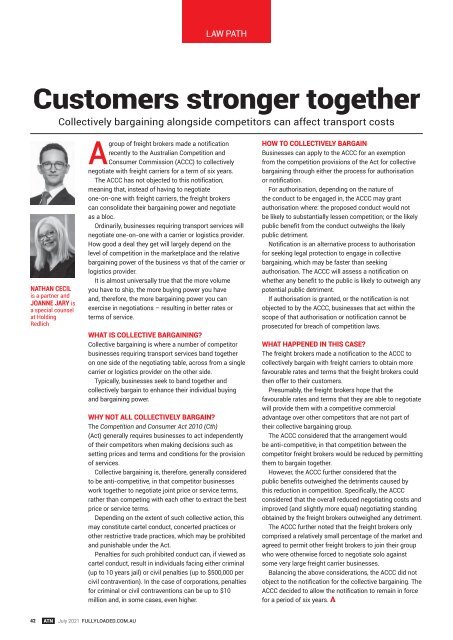You also want an ePaper? Increase the reach of your titles
YUMPU automatically turns print PDFs into web optimized ePapers that Google loves.
LAW PATH<br />
Customers stronger together<br />
Collectively bargaining alongside competitors can affect transport costs<br />
NATHAN CECIL<br />
is a partner and<br />
JOANNE JARY is<br />
a special counsel<br />
at Holding<br />
Redlich<br />
Agroup of freight brokers made a notification<br />
recently to the Australian Competition and<br />
Consumer Commission (ACCC) to collectively<br />
negotiate with freight carriers for a term of six years.<br />
The ACCC has not objected to this notification,<br />
meaning that, instead of having to negotiate<br />
one-on-one with freight carriers, the freight brokers<br />
can consolidate their bargaining power and negotiate<br />
as a bloc.<br />
Ordinarily, businesses requiring transport services will<br />
negotiate one-on-one with a carrier or logistics provider.<br />
How good a deal they get will largely depend on the<br />
level of competition in the marketplace and the relative<br />
bargaining power of the business vs that of the carrier or<br />
logistics provider.<br />
It is almost universally true that the more volume<br />
you have to ship, the more buying power you have<br />
and, therefore, the more bargaining power you can<br />
exercise in negotiations – resulting in better rates or<br />
terms of service.<br />
WHAT IS COLLECTIVE BARGAINING?<br />
Collective bargaining is where a number of competitor<br />
businesses requiring transport services band together<br />
on one side of the negotiating table, across from a single<br />
carrier or logistics provider on the other side.<br />
Typically, businesses seek to band together and<br />
collectively bargain to enhance their individual buying<br />
and bargaining power.<br />
WHY NOT ALL COLLECTIVELY BARGAIN?<br />
The Competition and Consumer Act 2010 (Cth)<br />
(Act) generally requires businesses to act independently<br />
of their competitors when making decisions such as<br />
setting prices and terms and conditions for the provision<br />
of services.<br />
Collective bargaining is, therefore, generally considered<br />
to be anti-competitive, in that competitor businesses<br />
work together to negotiate joint price or service terms,<br />
rather than competing with each other to extract the best<br />
price or service terms.<br />
Depending on the extent of such collective action, this<br />
may constitute cartel conduct, concerted practices or<br />
other restrictive trade practices, which may be prohibited<br />
and punishable under the Act.<br />
Penalties for such prohibited conduct can, if viewed as<br />
cartel conduct, result in individuals facing either criminal<br />
(up to 10 years jail) or civil penalties (up to $500,000 per<br />
civil contravention). In the case of corporations, penalties<br />
for criminal or civil contraventions can be up to $10<br />
million and, in some cases, even higher.<br />
HOW TO COLLECTIVELY BARGAIN<br />
Businesses can apply to the ACCC for an exemption<br />
from the competition provisions of the Act for collective<br />
bargaining through either the process for authorisation<br />
or notification.<br />
For authorisation, depending on the nature of<br />
the conduct to be engaged in, the ACCC may grant<br />
authorisation where: the proposed conduct would not<br />
be likely to substantially lessen competition; or the likely<br />
public benefit from the conduct outweighs the likely<br />
public detriment.<br />
Notification is an alternative process to authorisation<br />
for seeking legal protection to engage in collective<br />
bargaining, which may be faster than seeking<br />
authorisation. The ACCC will assess a notification on<br />
whether any benefit to the public is likely to outweigh any<br />
potential public detriment.<br />
If authorisation is granted, or the notification is not<br />
objected to by the ACCC, businesses that act within the<br />
scope of that authorisation or notification cannot be<br />
prosecuted for breach of competition laws.<br />
WHAT HAPPENED IN THIS CASE?<br />
The freight brokers made a notification to the ACCC to<br />
collectively bargain with freight carriers to obtain more<br />
favourable rates and terms that the freight brokers could<br />
then offer to their customers.<br />
Presumably, the freight brokers hope that the<br />
favourable rates and terms that they are able to negotiate<br />
will provide them with a competitive commercial<br />
advantage over other competitors that are not part of<br />
their collective bargaining group.<br />
The ACCC considered that the arrangement would<br />
be anti-competitive, in that competition between the<br />
competitor freight brokers would be reduced by permitting<br />
them to bargain together.<br />
However, the ACCC further considered that the<br />
public benefits outweighed the detriments caused by<br />
this reduction in competition. Specifically, the ACCC<br />
considered that the overall reduced negotiating costs and<br />
improved (and slightly more equal) negotiating standing<br />
obtained by the freight brokers outweighed any detriment.<br />
The ACCC further noted that the freight brokers only<br />
comprised a relatively small percentage of the market and<br />
agreed to permit other freight brokers to join their group<br />
who were otherwise forced to negotiate solo against<br />
some very large freight carrier businesses.<br />
Balancing the above considerations, the ACCC did not<br />
object to the notification for the collective bargaining. The<br />
ACCC decided to allow the notification to remain in force<br />
for a period of six years.<br />
42 <strong>ATN</strong> July 2021 FULLYLOADED.COM.AU
















